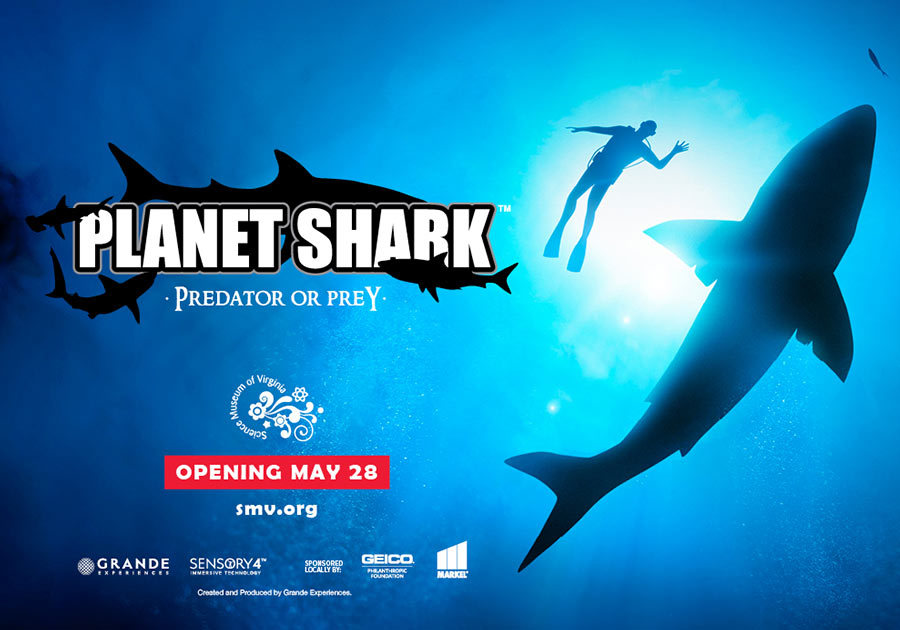What comes to mind when you think of sharks? If you envision a menacing creature that terrorizes the ocean accompanied by epic theme music, you’re not alone. But sadly, most of what has been portrayed in popular culture is more myth than reality. It turns out sharks are far more interesting and diverse than their stereotypical Hollywood portrayal. A new touring exhibition, Planet Shark: Predator or Prey, opening May 28, gives guests an unparalleled glimpse into the mysterious world of sharks and will leave them with a new appreciation for this often-misunderstood creature.
Sharks are one of the oldest and most iconic animals on Earth. Early fossil records show that sharks swam in our oceans and lakes as early as 450 million years ago, making them older than dinosaurs!
Unfortunately, for the first time in millions of years, sharks are under threat. In the last 50 years, humans have caused massive population collapses and have driven dozens of shark species to the brink of extinction. A drastic change in shark populations can have a catastrophic impact on the ecosystems in which sharks are top predators, the effects of which don’t stop at the shore.
Our fear of sharks makes them a difficult creature to encourage people to protect and conserve. Sharks are mysterious, and we often fear what we don’t understand. But the reality is sharks have more to fear from humans than we do from sharks.
According to the Florida Museum of Natural History International Shark Attack File (ISAF), 112 shark bites were confirmed in 2021. Humans aren’t typically on a shark’s menu, but we can generate signals similar to typical prey, such as a splashing fish or a seal silhouette, that lead to sharks taking action.
At the same time, while the exact number isn’t known, it’s estimated that 100 million sharks are killed a year for their fins, for their meat and cartilage, as part of sport fishing, and as the unintended catch from certain fishing methods.
Public education and awareness of just how truly remarkable sharks are and their role in our world can help replace fear with respect, and Planet Shark: Predator or Prey is a vital first step.
In Planet Shark: Predator or Prey, guests will trace millions of years of evolution, come face-to-face with the great white shark, learn more about the shark fin trade and gain a new level of respect for sharks of all shapes and sizes. The exhibition features shark models cast from real animals; a collection of real teeth and jaws; extremely rare fossils — some up to 370 million years old; captivating stories of human/shark encounters; detailed examinations of the shark’s amazing anatomy, biology, hunting strategies and sensory systems; and information on shark tagging programs and conservation efforts.
But information alone can’t remove the mystery that surrounds sharks. To do this, you have to dive into the shark’s world, and the exhibition gives you an incredible out-of-water experience in an immersive, multimedia gallery that features 45-minutes of some of the most stunning shark imagery ever filmed. Using SENSORY4™ technology, a system that incorporates an array of high-definition projectors combined with a cinema quality audio narrative, guests will experience an amazing display of life-size imagery so real they will feel as if they could reach right into the screen to touch the sharks. From witnessing coastal migrations to becoming a part of a feeding frenzy, this immersive experience is the closest guests can come to the shark’s world on dry land and will leave them in awe of the ocean’s oldest and most effective predator.
Once we know more about how truly remarkable sharks are, fear may be replaced with respect. After all, how many other animals can replace their teeth time and time again? Or have skin that feels smooth in one direction and rough in the other to reduce drag? Or have sensory organs that can detect not only the electrical field changes made by the muscle contraction of prey, but also Earth’s electromagnetic field?
Despite their reputation, sharks are not villains but an essential part of our marine ecosystem. We are lucky to have so many shark friends on our planet, but the next generation may not have the same opportunity.
Planet Shark: Predator or Prey is on display at the Science Museum through September 5. It was created and produced by Grande Experiences and is generously sponsored locally by Markel and GEICO Philanthropic Foundation. During regular Science Museum operating hours (9:30 a.m. to 5 p.m.), admission to Planet Shark: Predator or Prey is available through a combination ticket that includes access to the exhibition as well as regular Science Museum exhibits. The Science Museum is also offering extended hours on Friday (from June 3 – September 2) where Planet Shark: Predator or Prey will be the only exhibition open.
Visit smv.org for additional details and pricing.



